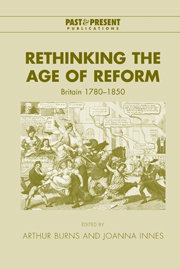Book contents
- Frontmatter
- Contents
- Notes on contributors
- Preface
- List of abbreviations
- 1 Introduction
- 2 ‘Reform’ in English public life: the fortunes of a word
- 3 Parliament, the state, and ‘Old Corruption’: conceptualizing reform, c. 1790–1832
- 4 ‘Old wine in new bottles’: the concept and practice of law reform, c. 1780–1830
- 5 English ‘church reform’ revisited, 1780–1840
- 6 Medicine in the age of reform
- 7 British antislavery reassessed
- 8 ‘The age of physiological reformers’: rethinking gender and domesticity in the age of reform
- 9 Reforming the aristocracy: opera and elite culture, 1780–1860
- 10 Reform on the London stage
- 11 Reforming culture: national art institutions in the age of reform
- 12 Irish reform between the 1798 Rebellion and the Great Famine
- 13 Empire and parliamentary reform: the 1832 Reform Act revisited
- 14 Reforms, movements for reform, and possibilities of reform: comparing Britain and continental Europe
- Index
- Past and Present Publications
3 - Parliament, the state, and ‘Old Corruption’: conceptualizing reform, c. 1790–1832
Published online by Cambridge University Press: 15 December 2009
- Frontmatter
- Contents
- Notes on contributors
- Preface
- List of abbreviations
- 1 Introduction
- 2 ‘Reform’ in English public life: the fortunes of a word
- 3 Parliament, the state, and ‘Old Corruption’: conceptualizing reform, c. 1790–1832
- 4 ‘Old wine in new bottles’: the concept and practice of law reform, c. 1780–1830
- 5 English ‘church reform’ revisited, 1780–1840
- 6 Medicine in the age of reform
- 7 British antislavery reassessed
- 8 ‘The age of physiological reformers’: rethinking gender and domesticity in the age of reform
- 9 Reforming the aristocracy: opera and elite culture, 1780–1860
- 10 Reform on the London stage
- 11 Reforming culture: national art institutions in the age of reform
- 12 Irish reform between the 1798 Rebellion and the Great Famine
- 13 Empire and parliamentary reform: the 1832 Reform Act revisited
- 14 Reforms, movements for reform, and possibilities of reform: comparing Britain and continental Europe
- Index
- Past and Present Publications
Summary
During and after the Napoleonic Wars, popular radicals such as William Cobbett routinely drew attention to what they called ‘Old Corruption’, or simply ‘Corruption’, or ‘the System’, or ‘the Thing’. They used such words interchangeably to describe a parasitic political system that took an unprecedented amount of tax money out of the pockets of Britons and transferred it to those of a narrow band of well-connected insiders through a wide variety of nefarious means. The latter included the grant of sinecures, reversions, church patronage, lucrative government contracts, an indirect-tax regime that obliged the common people to pay a disproportionate share of the state's fiscal burden, and a series of commercial and financial policies that served the interests of large landowners and City financiers at the expense of the unenfranchised.
This critique of systematic rapacity obviously owed much to the traditional ‘country’ suspicion of placemen, stockjobbers, and the like, and just as much to Thomas Paine's Rights of Man, which devoted so much attention to the maldistributive effects of a ‘government of loaves and fishes’ that thrived on chronic warfare. But the critique of ‘Old Corruption’ in the early nineteenth century was in many respects a critique of something quite new, for it was chiefly propelled by the enormous scale of the British war effort against revolutionary and Napoleonic France.
- Type
- Chapter
- Information
- Rethinking the Age of ReformBritain 1780–1850, pp. 98 - 113Publisher: Cambridge University PressPrint publication year: 2003
- 4
- Cited by



